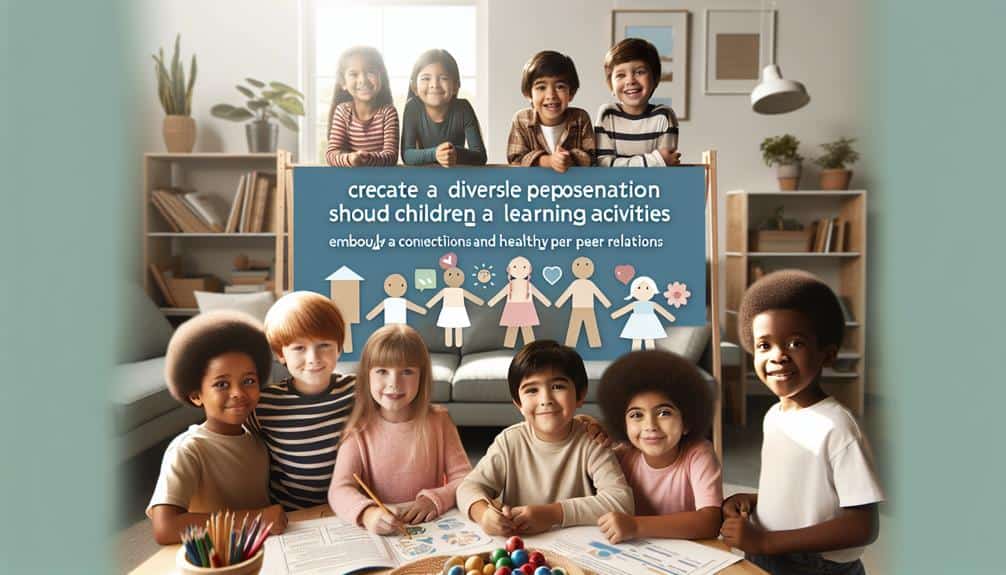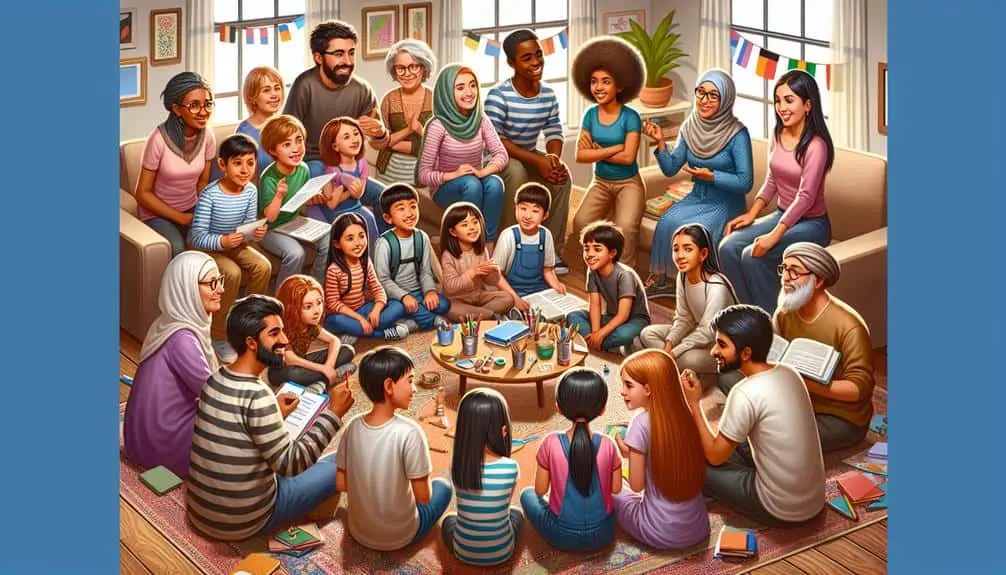Exploring peer relationships in homeschool socialization is essential for your child's emotional growth. Interacting with peers helps build empathy and important social skills. To enhance socialization, deliberately expose your child to diverse social experiences. Encourage participation in group activities to develop teamwork and leadership abilities. Overcome challenges by understanding peer dynamics and creating opportunities for interaction. Strengthen peer connections by addressing socialization obstacles, fostering friendships, and organizing social gatherings. Promote positive relationships through teaching friendship skills and modeling kindness. Mastering peer relationships is a key aspect of homeschool socialization for your child's overall development.
Key Points
- Implement diverse socialization techniques to foster empathy and emotional development.
- Create opportunities for social interaction to build relationships beyond immediate circles.
- Facilitate group activities to enhance interpersonal skills and teamwork.
- Overcome socialization challenges by understanding peer dynamics and fostering communication.
- Encourage positive peer relationships through teaching friendship skills and promoting inclusivity.
Importance of Peer Interaction
Regular peer interaction is essential for the social and emotional development of homeschool students. Developing empathy is a critical aspect of peer interaction. Through engaging with peers, homeschool students can learn to understand and share the feelings of others, which is a fundamental skill in building strong relationships. By observing and experiencing different emotions within a social setting, students can develop a sense of empathy that extends beyond their immediate circle.
Furthermore, fostering communication is another key benefit of peer interaction. Effective communication is important for expressing thoughts, feelings, and ideas clearly and respectfully. Through regular peer interactions, homeschool students have the opportunity to practice articulating their thoughts and listening to others. These experiences help in honing communication skills, such as active listening and expressing oneself effectively.
Strategies for Socializing Homeschooled Children
Effective strategies for socializing homeschooled children encompass intentional facilitation of diverse social experiences to enhance their interpersonal skills and foster a sense of community. Group activities play an essential role in providing homeschooled children with opportunities to interact with peers in a structured setting. Engaging in group activities such as sports teams, art classes, or scouting groups can help children develop teamwork, communication, and leadership skills while forming friendships outside the home.
Community involvement is another key strategy for socializing homeschooled children. Encouraging participation in community events, volunteering opportunities, or local clubs can broaden their social circle and expose them to a variety of individuals from different backgrounds. This not only helps in building social skills but also instills a sense of belonging and responsibility towards the community.
Overcoming Socialization Challenges
To navigate and address socialization challenges faced by homeschooled children, a proactive approach is essential in fostering their social development and integration into various social settings.
When overcoming socialization challenges, consider the following:
- Implement Diverse Socialization Techniques: Encourage participation in extracurricular activities, community events, and group projects to enhance social skills and interactions outside the home environment.
- Understand Peer Dynamics: Help your child understand the dynamics of peer relationships, including communication styles, conflict resolution, and empathy, to navigate social situations effectively.
- Create Opportunities for Social Interaction: Arrange playdates, join homeschooling cooperatives, or enroll in classes like art or sports to provide opportunities for your child to engage with peers in a structured setting.
- Foster Open Communication: Encourage your child to express concerns or feelings about social challenges they encounter, and offer guidance and support to build their confidence in social settings.
Building Strong Peer Connections
Handling and addressing socialization challenges can pave the way for homeschooled children to build strong peer connections, fostering their social development and integration into various social settings. Forming bonds and fostering friendships is vital in this process. Encouraging your child to engage in group activities, sports, or community events can provide opportunities for them to meet peers with similar interests, facilitating the formation of meaningful relationships. Creating connections and building trust takes time and effort, but it's essential for establishing a solid peer network.
Facilitate social gatherings with other homeschooling families or enroll your child in extracurricular classes to expand their social circle. Encourage open communication and teach your child essential social skills such as active listening, empathy, and conflict resolution. Providing opportunities for your child to interact with peers in both structured and unstructured settings can help them navigate social dynamics effectively. By nurturing these connections, your child can develop lasting friendships and feel more confident in social situations.
Encouraging Positive Peer Relationships
Encouraging healthy peer relationships in homeschooling environments is pivotal for nurturing social skills and fostering emotional well-being in children. To promote positive peer interactions, consider the following strategies:
- Teach Friendship Skills: Provide opportunities for children to learn about empathy, communication, cooperation, and conflict resolution. These skills are essential for building and maintaining positive relationships with peers.
- Foster Peer Support: Encourage children to support and uplift their peers. Creating a culture of kindness and inclusivity can enhance the overall social environment and promote a sense of community among homeschooling peers.
- Facilitate Social Activities: Organize group activities or outings where children can interact, collaborate, and bond with one another. These shared experiences can strengthen connections and foster a sense of camaraderie among peers.
- Model Positive Relationships: As a parent or educator, demonstrate healthy relationships through your interactions with others. Children often learn by example, so modeling positive communication, respect, and empathy can influence their own peer relationships positively.




